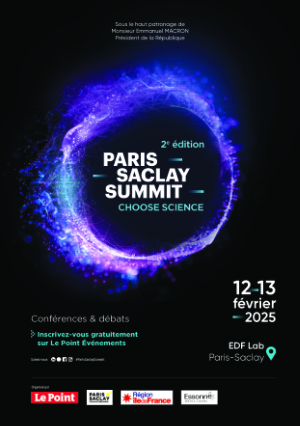PhD project in chemical biology / Liposome-fed cultures of the model organism Caenorhabditis elegans and their application in the study of fatty acid metabolism
| ABG-127579 | Sujet de Thèse | |
| 14/12/2024 | Financement public/privé |
- Chimie
- Biologie
Description du sujet
The objective of this PhD research project is the establishment of liposome-fed axenic cultures of the model organism Caenorhabditis elegans and their application for the analysis of fatty acid metabolism using incorporation experiments with stable isotope labelled precursors, comparative metabolomics, and reverse genetics.
The nematode C. elegans represents one of the best understood multicellular organisms in science, but its chemistry and secondary metabolism has remained largely enigmatic. Ongoing research at the laboratory for bioanalytical chemistry aims to decipher the metabolic pathways that connect fatty acid metabolism with the biosynthesis of highly conserved glycolipids, which act as signaling molecules and regulate nematode development and behavior.
Previous research has demonstrated that C. elegans can be efficiently cultivated under highly controlled axenic culture conditions when fed with liposomes (artificial spherical vesicles composed of defined phospholipids), which appear to supplement for the nematode’s natural bacterial diet (doi: 10.1534/g3.117.300325). Because C. elegans’ fatty acids are predominantly biosynthesized by elongation and desaturation of bacterial food derived fatty acids, establishing a liposome-based artificial diet that provides full control of C. elegans’ fatty acid intake along with its application to wildtype and mutant C. elegans provides a powerful tool to probe fatty acid biosynthesis and metabolism in this important model organism.
This project will combine axenic culture techniques, isotope incorporation experiments, comparative metabolomics, reverse genetics, and biosynthetic pathway elucidation. In addition, the PhD candidate will have the opportunity to contribute to other research projects at the laboratory for bioanalytical chemistry.
Prise de fonction :
Nature du financement
Précisions sur le financement
Présentation établissement et labo d'accueil
The Laboratory for Bioanalytical Chemistry at the University of Neuchâtel (Switzerland) invites applications for a PhD research position at the interface of natural products chemistry, biosynthetic studies, and comparative metabolomics. The PhD candidate will work under the supervision of Prof. Stephan von Reuss (stephan.vonreuss@unine.ch).
The objective of this position is to design, perform, and analyze high quality scientific research experiments that contribute to the elucidation of the biosynthetic steps that connect fatty acid metabolism with the biosynthesis of highly conserved nematode glycolipids. Meaningful and significant results will be presented on conferences, published in scientific journals, and should be described in the candidates PhD thesis to ultimately earn a PhD title in Chemistry.
While the major focus of this position is research for the PhD thesis and scientific publications, PhD students at the Institute of Chemistry are also responsible for the supervision of practical laboratory courses for undergraduate students and the supervision and training of apprentices at the. Furthermore, PhD students have the opportunity to participate in PhD-level courses in organismal biology / chemical ecology as part of her/his doctoral work at the faculty of sciences.
The Laboratory for Bioanalytical Chemistry provides the advantages of a small research institution with well-equipped laboratories for total synthesis, nematode cultivation, and natural product isolation, along with privileged access to state of the art analytical techniques, such as UPLC-HR-MS and a 600 MHz NMR instrument via the Neuchâtel Platform for Analytical Chemistry (NPAC), which represents an excellent environment for enthusiastic, self-motivated, and independent young researchers eager to develop their skills and scientific profile.
Intitulé du doctorat
Pays d'obtention du doctorat
Etablissement délivrant le doctorat
Profil du candidat
Applicants require a MSc degree in Organic Chemistry, Natural Products Chemistry, Chemical Biology, Life Sciences, or a closely related field.
Demonstrated practical experience axenic culture techniques and comparative metabolomics is essential.
Furthermore, basic knowledge of secondary metabolism and molecular biology is required for PhD candidates to quickly develop a solid understanding of biosynthetic pathways (especially fatty acid biosynthesis and β-oxidation) and their elucidation via isotope labelling strategies, comparative metabolomics, and reverse genetics.
Very good command of English (reading, writing, speaking) is required. Basic knowledge of French for teaching duties is highly desirable.
Successful PhD candidates are expected to design, execute, and analyze high-quality experiments, show self-motivation in order to independently develop their own research projects and accumulate meaningful and significant results, while being available to collaborate with team members and external collaborators and contribute to other research projects with their expertise and skills.
Vous avez déjà un compte ?
Nouvel utilisateur ?
Vous souhaitez recevoir nos infolettres ?
Découvrez nos adhérents
 Institut de Radioprotection et de Sureté Nucléaire - IRSN - Siège
Institut de Radioprotection et de Sureté Nucléaire - IRSN - Siège  Tecknowmetrix
Tecknowmetrix  ANRT
ANRT  Ifremer
Ifremer  ONERA - The French Aerospace Lab
ONERA - The French Aerospace Lab  CESI
CESI  PhDOOC
PhDOOC  Laboratoire National de Métrologie et d'Essais - LNE
Laboratoire National de Métrologie et d'Essais - LNE  Institut Sup'biotech de Paris
Institut Sup'biotech de Paris  Aérocentre, Pôle d'excellence régional
Aérocentre, Pôle d'excellence régional  TotalEnergies
TotalEnergies  Groupe AFNOR - Association française de normalisation
Groupe AFNOR - Association française de normalisation  MabDesign
MabDesign  ADEME
ADEME  SUEZ
SUEZ  Généthon
Généthon  CASDEN
CASDEN  Nokia Bell Labs France
Nokia Bell Labs France  MabDesign
MabDesign




